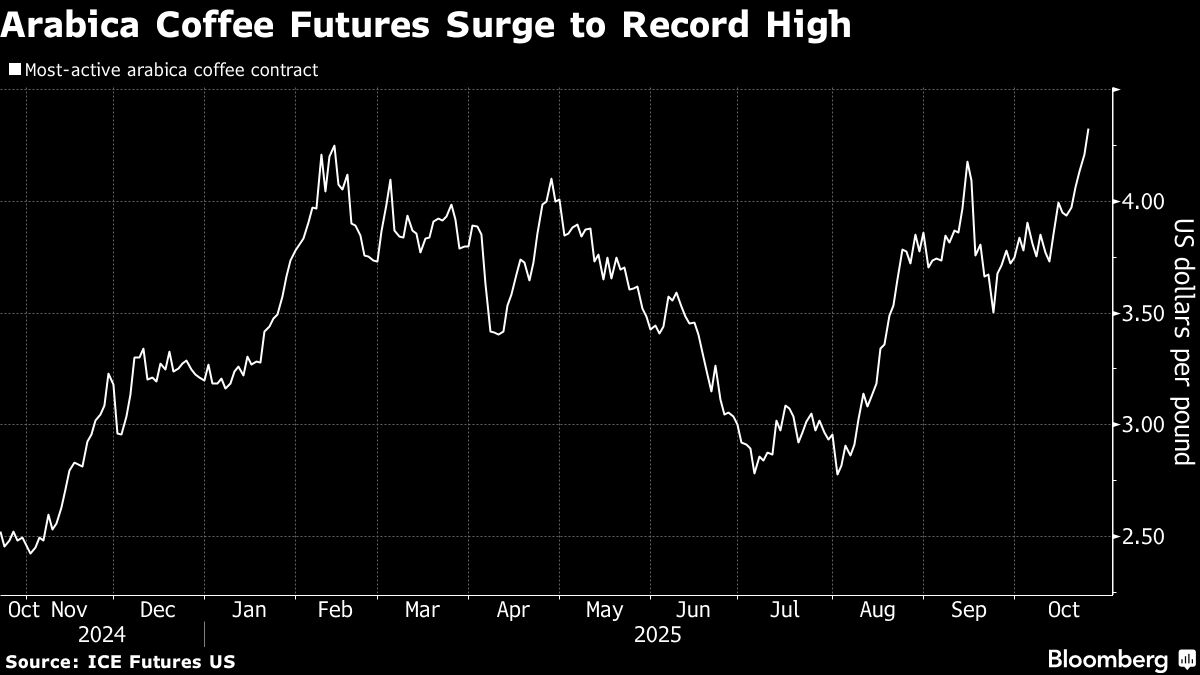
Coffee futures rose to a fresh record in New York as US tariffs and crop concerns keep supplies constrained, risking further price hikes at cafes and supermarkets.
Prices of arabica, the variety favored by chains such as Starbucks Corp. for specialty brews, climbed as much as 4.1% to an all-time high of $4.3795 a pound. Futures had set the prior record of $4.2995 a pound in February on heightened fears that top grower Brazil would be further affected by adverse weather.
Futures are up about 50% since early August as US tariffs and an inverted market structure — in which the current contract is priced at a premium to future ones — have exacerbated the steep price rally by spurring a steep drawdown of inventories at exchange-monitored warehouses. Those stockpiles overall are at the lowest since early 2024, while containing the least Brazilian beans on record.
Market players from importers to small and large commercial roasters alike are holding “very small amounts of inventory,” putting near-term supplies including in exchange inventories in “super high demand,” said Sam Klein, a green coffee buyer at Partners Coffee.
The New York-based roaster has been “taking shorter positions everywhere and trying not to have the risk of having, say, a container on the books that's going to ship in three months from an origin where on any given day there might be some political dispute,” Klein said.
“We're in a circumstance where basically every roaster in the states is just waiting to see when there's going to be a better market to book coffee at,” Klein said. “Even if people aren't feeling great about the direction the market's going to go in, it also doesn't feel great to book a year's worth of coffee at a historically high level.”
President Donald Trump's 50% levies on Brazilian beans took effect in August, and the coffee trade between the two countries has largely stalled since. The coffee industries on both sides of the borders have lobbied for those tariffs to be lifted. Meanwhile, the US president also threatened new fees on Colombia last weekend. The two countries are the biggest suppliers of coffee to the US, risking further price pain for American consumers already paying record coffee prices.

The premium on near-term beans in an inverted market was already discouraging trade as importers were hesitant to move expensive beans for fear that they would lose money later on if they couldn't sell them immediately. Tariffs have only made US buyers more risk-averse, said Tomas Araujo, a senior trader at StoneX.
“There's a double effect with these tariffs. Obviously the roaster doesn't want to pay because he doesn't want to keep adding to his costs,” Araujo said. “But also the importer is even less incentivized to take more risk and bring coffee to the market, which is what we need. That's the problem we have in this market: There is coffee, but it's in the wrong place. It's all in origin, and it needs to be in destination.”
The last time prices surged to a record in February, the market was hit with a cash crunch as importers and exporters needed to finance higher margin calls to maintain positions and the physical movement of beans during harvest. Importers were unable to purchase new coffee, so exporters who were long had to discount the commodity in order to move beans to consuming countries like the US, Araujo said. Current prices could encourage similar activity.
In the meantime, some prices in Brazil have weakened enough that it could become profitable to deliver those beans to the futures exchange, but that is unlikely to happen against the most-active December futures contract, said Joseph Centorino, vice president of finance and operations at Pan American Coffee.
The Intercontinental Exchange will also raise its premium for beans from Colombia, Kenya and Costa Rica starting with the March 2026 arabica contract, potentially encouraging deliveries.
“Origin stocks are healthy, but unless producers start selling or merchants and roasters begin buying, the supply remains stuck, and coffee there doesn't fill up our morning cups here,” Centorino said.
Prices:
Arabica coffee rose 0.75% to 424.00 cents per pound at 11:11 a.m. in New York
The robusta variety in London was down 1.4%
Arabica coffee's premium over robusta surged to about 215 cents per pound, marking the widest gap in data going back to 2008
Essential Business Intelligence, Continuous LIVE TV, Sharp Market Insights, Practical Personal Finance Advice and Latest Stories — On NDTV Profit.




















